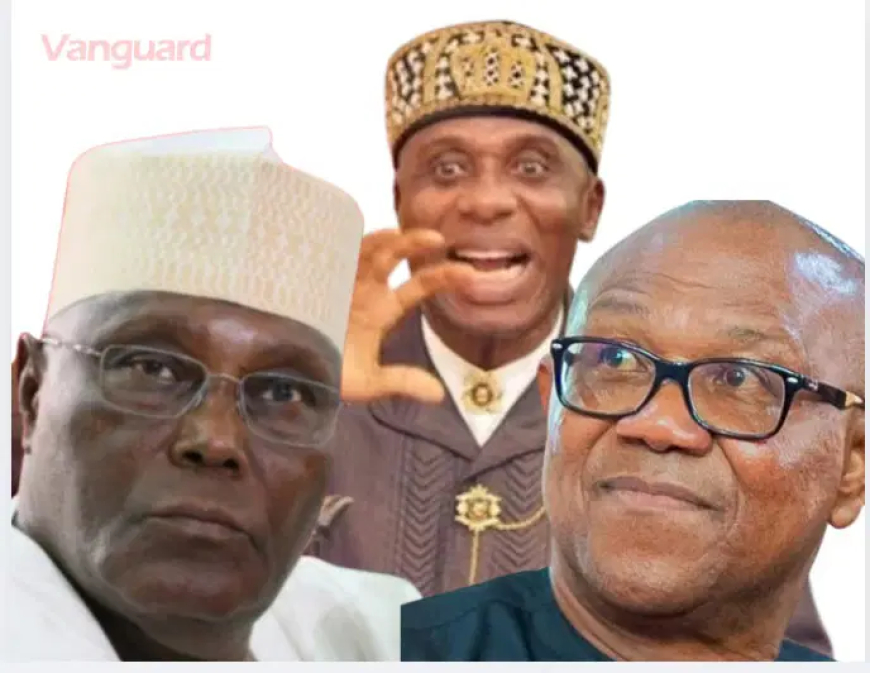Coalition: ADC faces power struggles, presidential ticket’s zoning politics

Barely 24 hours after the unveiling of the newly-formed African Democratic Congress, ADC, coalition, attention has quickly shifted from the spirit of unity to individual ambitions. Meanwhile, the opposition platform’s primary objective is to challenge President Bola Tinubu in 2027 elections
The coalition, introduced as a viable alternative to the ruling All Progressives Congress, APC, includes prominent political figures such as former Vice President Atiku Abubakar, former Kaduna Governor Nasir El-Rufai, former Labour Party presidential candidate Peter Obi, former Minister of Transportation Rotimi Amaechi, and former Senate President David Mark.
What began as a joint effort by politicians with divergent ideologies is now revealing early signs of internal competition, with separate narratives emerging from the camps of leading contenders.
Amaechi declares interest
Former Minister of Transportation and ex-Governor of Rivers State, Rotimi Amaechi, has officially announced his intention to contest the 2027 presidential election under the ADC banner.
During an interview on Channels TV’s ‘Politics Today’ on Thursday, Amaechi confirmed he would serve only one term if elected, citing worsening economic conditions and insecurity as grounds for the removal of the Tinubu administration.
Asked if he would commit to a single term, Amaechi replied, “Of course.” He also argued that the South should retain the presidency, stating: “The South must be allowed to complete their tenure.”
With his declaration, competition within the ADC has effectively begun, with aspirants promoting their political agendas under the guise of party unity.
Datti: Obi should lead the Coalition
Yusuf Datti Baba-Ahmed, Obi’s 2023 running mate, has publicly stated that Peter Obi should be the coalition’s presidential candidate
According to him, Obi’s popularity among the youth and his performance in the last general election — despite the disputed result — makes him the most viable candidate to galvanise public support for the ADC.
Peter Obi should not be a vice-presidential candidate in 2027, having earned a contested 10 million votes,” Datti said during an interview on Arise TV.
Although Obi has not resigned from the Labour Party, his involvement in the ADC coalition has strengthened speculation that he may contest under its platform or withdraw altogether if the party’s nomination does not favour him.
Despite publicly recognising Atiku as his political elder, Obi’s allies insist he is the more widely accepted candidate within the emerging coalition, especially given the prevailing call for a southern presidency.
Atiku’s strategic move
Atiku Abubakar, although silent on his candidacy, is believed to be positioning himself for what could be his final attempt at the presidency. If nominated, 2027 would mark his seventh campaign for Nigeria’s top office.
With the PDP weakened by internal divisions, Atiku reportedly spearheaded the ADC coalition to build a stronger opposition platform. Political observers, however, argue that his motivations are far from altruistic.
Despite growing calls for a southern candidate, Atiku’s supporters are confident in the North’s numerical strength and its historic role in deciding national elections.
The ADC primaries are expected to be highly competitive, and Atiku’s well-known ability to win intra-party contests remains a major factor in the months ahead.
Obi and Atiku loyalists mobilise
Neither Obi nor Atiku has made a formal declaration. But their respective allies are already building support within the ADC. While youth-based groups are mobilising for Obi, several influential PDP figures in the North are aligning behind Atiku.
There is ongoing speculation that a joint ticket could be proposed, with Obi as a running mate. However, Datti’s firm position and the stance of the Obidient movement suggest that any proposal short of the presidential slot for Obi would be rejected outright.
ADC under pressure
Though the coalition has generated significant attention, it is not immune to internal friction. Former ADC presidential candidate Dumebi Kachikwu has raised concerns about potential manipulation of the selection process in favour of Atiku or another candidate.
There’s an elite plan already taking shape behind the scenes. We must be vigilant,” Kachikwu warned.
Meanwhile, opposition figure Dele Momodu has played down these concerns, claiming that coalition leaders have agreed to prioritise party cohesion and prevent internal divisions.
“No ambition will override the broader objective,” Momodu said in an interview with Vanguard. He reaffirmed this view during a separate interview on Arise TV, adding that members have committed to resolving disputes through consensus.
APC, Presidency react
The APC and its supporters have dismissed the new opposition bloc. FCT Minister Nyesom Wike criticised the ADC as lacking in organisational capacity, while Festus Keyamo described the coalition as a “fractured arrangement” that inadvertently strengthens the APC.
The presidency also issued a statement calling the alliance “a hollow arrangement of displaced politicians driven by self-interest.”
Outlook for 2027
With Amaechi’s declaration, Datti’s endorsement of Obi, and Atiku’s careful positioning, the ADC is navigating a complex internal landscape.
How the party manages these competing ambitions and conducts its primaries will determine whether the coalition presents a genuine challenge to the ruling party or unravels before the race begins.

 admin
admin 


